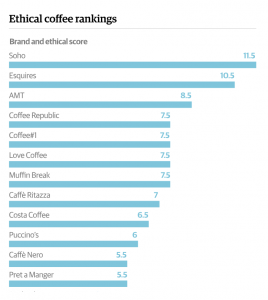Business ethics, like ethics in all areas, can be quite controversial. Many corporations may take shortcuts to decrease their costs, but at what expense do they come? Lately there has been an increase in demand for Fairtrade and organic products, further slamming unethical practices1.
Image One 2
In a relatively recent article, the Guardian revealed that Starbucks was amongst some of the most unethical coffee shops in the UK. This was calculated using a combination of factors consisting of unethical financial activities, treatment of workers, product sources and more. Starbucks in particular was condemned for cutting employee lunch breaks, trade union violations and tax avoidance. These actions may have resulted in cutting their costs but have ultimately come back to bite them, particularly when Starbuck’s tax evasion was brought to light. The large multinational corporation admitted to paying only “£8.6 million in tax since 1998”3 which resulted in a fall in sales across the UK. Other companies also slammed for their unethical practices include Café Nero, Pret a manger and Harris & Hoole.
However, Starbucks do go some way to achieving a level of ethical standing by using 99% Fairtrade coffee in its stores, although many consumers have decided to change to independent coffee shops.
